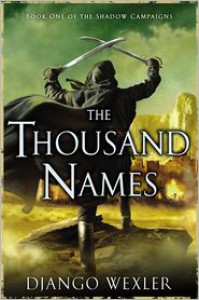20138
Followers
7
Following
Qui Est In Literis - MR Graham's Ramblings
MR Graham loves books. She loves the feel, the smell, and the stories inside. After careful consideration, however, she has decided the taste leaves something to be desired.
The Thousand Names: Book One of The Shadow Campaigns
 The Good:
The Good:I dig it. I really do. This was my first introduction to flintlock fantasy, and I loved it.
I loved Winter Ihernglass. She's a strong female protagonist without being a "strong female protagonist." Call me revolutionary, but I love it when authors write women as people. She works hard to pass for a man. She is strategically competent. She can fire a musket and wield a sword, but she never strays into the frigid automaton territory that often consumes "strong" heroines. She is also a caregiver, insecure, devoted to her friends, paranoid about blowing her cover, and trying desperately to cope with the crap life keeps throwing at her. Most importantly, she is defined by her circumstances and her actions, not by her relationships with men.
Colonel Janus Vhalnich was pretty awesome, as well. I have a thing for emotionally detached, scholarly, brilliant characters, and Janus struck me as particularly Holmesian. I'd say he almost seemed to be borderline Asperger's - hyperattentive, obsessive, with some trouble expressing his interests in ways other people can understand. I was wary of the character at first, because he came off as the setup for some deus ex machina, but my fears were unfounded, and he grew into something very, very interesting. I'd like to see passages from his perspective in future books.
The system of magic was extremely cool, and treated very originally. Actually explaining why would stray into spoiler territory, though.
Lastly, I loved that, though this is the first in a series, it ended with pretty thorough closure. All the major plot points were resolved, and though the end set up the basic conflict for the next books, there's no teeth-grindingly heinous cliffhanger. You could read it as a stand-alone.
The Bad:
The naming conventions. They felt very arbitrary to me, as though Wexler didn't bother to assign a set of phoneme frequencies or an orthography to each culture. The Vordanai have given names like Winter, Marcus, Jen, Janus, and Fitz, while the surnames that accompany them are Ihernglass, d'Ivoire, Alhundt, bet Vhalnich, and Warus. The Khandarai are Feor and Khtoba and Onvidaer and Jaffa. Neither set of names sounds as though it can be attributed to a single language or language family, and there was no cultural information given that could explain the disconnect.
In Conclusion:
Recommended for those who dig A Song of Ice and Fire and other such military-political fantasy.
*Note: I received a free proof copy of this book and was encouraged but not required to review. Said copy, being a proof, had not undergone final edits, and was a bit typo-laden. I assume most or all such errors have been rectified in the final publication.


